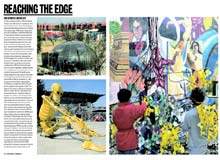
Edited by Ricky Burdett, professor of architecture and urbanism at the London School of Economics (LSE) and Design Museum director Deyan Sudjic, The Endless City is a vast doorstop of essays examining how New York, Shanghai, London, Mexico City, Johannesburg and Berlin work, and where they are headed, taking on board key factors from the social to the economic. It doesn’t just show how cities are changing but also how they are changing us, whether we like it or not.
The Endless City arose out of the Urban Age Project, an international organisation that seeks to create a new urban agenda for global cities. The starting point of the project originated by Richard Sennett, professor of social and cultural theory at LSE, and Burdett was that a successful city is created and formed both by politics and by ideas about space and architecture. The project toured the six cities and brought together the main players in how they are built and run.
The resulting book is big on facts and charts with contributions from 30 writers, including sociologist and economist Saskia Sassen and architect Rem Koolhaas. The haunting images of cities punctuate the pages and reflect the essential contradiction at the heart of man’s relationship with the city – allure and repulsion. Sudjic asks for urbanists to avoid the trap of believing that solutions appropriate to one city will necessarily work in another and even goes as far as to suggest that there should be ‘urbanism without urbanists’.
‘In Search of Authenticity’ by Rem Koolhaas attacks the complacency of those involved in the design of public spaces, which he champions as ‘the dominant experience of the city’, which has become ‘hyper-nostalgic’ in the developed world and is non-existent in developing cities like Lagos, a capital that has grown from 300,000 people in 1950 to ten million today.
The developing world, which accounts for 70% of new city dwellers, provides plenty of forewarnings of future strife. "We live on a curious diet of harmlessness alternating with catastrophe," says Koolhaas. It seems the one question The Endless City cannot answer is whether the cities of the future will be visions of utopia or dystopian monsters.
See Also:
URBAN DEVELOPMENT
How well do you really know your competitors?
Access the most comprehensive Company Profiles on the market, powered by GlobalData. Save hours of research. Gain competitive edge.

Thank you!
Your download email will arrive shortly
Not ready to buy yet? Download a free sample
We are confident about the unique quality of our Company Profiles. However, we want you to make the most beneficial decision for your business, so we offer a free sample that you can download by submitting the below form
By GlobalDataRicky Burdett answers a few questions for The LEAF Review. This interview can be found in full through the below link.
What makes a city great?
I think the most important thing is resilience, the ability to adapt and change which means both the physical and economic ability.
What do you think of the pace and scale of change in cities?
A few very good examples of cities and city leaders who have been able to implement change can be found in Bogotá, Barcelona and London. There are unfortunately many more examples of cities that have gone in the wrong direction and I don’t feel optimistic.
Mexico City up until now has been an example of what not to do in terms of letting the city sprawl and using water resources in a very negative way. There are many others like that.
Were you surprised by the findings?
I am very surprised by the speed of change of some of the cities. I had no idea before we started the research report that you would have between 50 and 60 people an hour moving into a city like Lagos or Shanghai.
Can a remedy for one city be used for others?
One should never think that one size fits all. Something that works in London will not necessarily work for Jakarta. I would not say that introducing a congestion charge would solve the transport problems everywhere.







